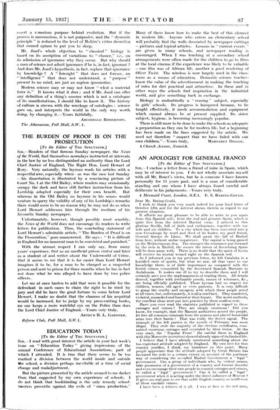THE BURDEN OF PROOF IS ON THE PROSECUTION [To the
Editor of THE SPECTATOR.] SIR,--Readers of that famous Sunday newspaper, the News of the World, find themselves nowadays instructed at intervals in the law by no less distinguished an authority than the Lord Chief Justice of England, The Right Hon. Lord Hewart of Bury. Very naturally, the layman reads his articles with a respectful awe, especially when—as was the case last Sunday —his dissertation is illustrated by a convincing picture of -Court No. 1 at the Old Bailey, where readers may occasionally occupy the dock and have still further instruction from his Lordship adapted especially for their own benefit. But whereas in the Old Bailey no layman in his senses would venture to query the validity of any of his Lordship's remarks there would seem to be no reason why he may not do so when Lord Hewart addresses him through the medium of his favourite Sunday newspaper.
Unfortunately, however, though possibly most sensibly, the News of the World does not encourage its readers to write letters for publication. Thus, the concluding statement of Lord Hewart's admirable article, " The Burden of Proof is on the Prosecution," goes unanswered. He says : " It is difficult in England for an innocent man to be convicted and punished."
With the utmost respect I can only say, from many years' experience, first as an unofficial prison visitor and later as .0 student of and writer about the Underworld of Crime, that it seems to me that it is far easier than Lord Hewart imagines it to be, for a man to be charged as a suspected person and sent to prison for three months when he has in fact not done what he was alleged to have done by two police officers.
- Let me at once hasten to add that were it possible for the defendant in such cases to claim the right to be tried by jury and did he have the good fortune to come before Lord Hewart, I make no doubt that the chances of his acquittal would .be increased, for to judge by my press-cutting books, no one keeps a more watchful eye on the Police than does the Lord Chief Justice of England.—Yours very truly,










































 Previous page
Previous page